Kotlin
A concise multiplatform language developed by JetBrains
KotlinConf 2023: A Look at the Opening Keynote
At the KotlinConf 2023 opening keynote, Roman Elizarov, Svetlana Isakova, and Egor Tolstoy made several exciting announcements regarding JetBrains’ recent work on the Kotlin language, while Grace Kloba shared the latest news from Google:
- The K2 compiler will be released in Kotlin 2.0.
- The Gradle Kotlin DSL will be the default for new builds.
- Kotlin language adoption is skyrocketing at Google.
- The Kotlin Foundation is launching a funding program for library authors and a membership program for companies.
- Kotlin Multiplatform will become stable this year.
- Compose for iOS is in Alpha.
- Experimental Compose for Web will be powered by Kotlin/Wasm.
Watch the keynote or read on for the main announcements.
The conference has just started in Amsterdam and is set to take place today and tomorrow, April 13 and 14.
📽️ If you’re eager to immerse yourself in the event, explore the schedule and handpick the most captivating talks to enjoy via livestream!
Kotlin 2.0 and further language evolution
Back in 2019, we started developing the new K2 compiler, aiming for a performance breakthrough. As work on the new compiler nears completion, we’re thrilled to announce that it will be released as Kotlin 2.0, following version 1.9.
The most notable improvement in the new compiler is a substantial increase in compilation speed. With the new architecture, the compilation pipeline will be twice as fast! Of course, exact speed improvements will vary depending on the specific project.
You can see an example of the compilation speed improvement for the Kotlin compiler building itself with the 2.0 version preview below.
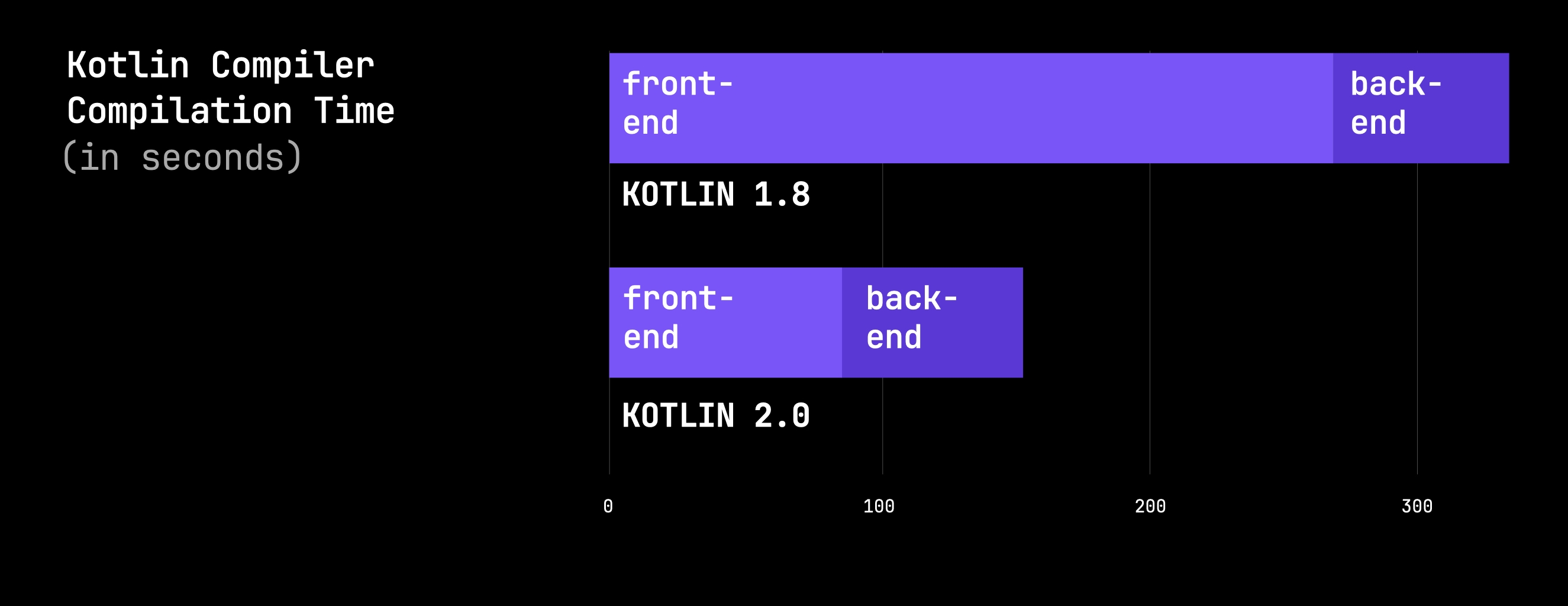
Try Kotlin 2.0
We develop Kotlin and make design decisions based on your invaluable feedback and insights. Please try Kotlin 2.0 and tell us whether it works for you and what problems you run into. Starting with Kotlin 1.8.20, you can enable a preview of the Kotlin 2.0 language version via the regular Kotlin language version flag.
Provide your feedback directly to Kotlin 2.0 developers on YouTrack.
New tooling and compiler plugins
Kotlin 2.0 is going to accelerate future language evolution. With the new architecture, we can introduce new features faster without having to make dozens of modifications to the compiler. It is also considerably more powerful regarding what can be accomplished outside of the language using compiler plugins.
The new compiler will also be incorporated into many tools. The Kotlin IDE plugin will be rewritten. Google is working on an update for the Kotlin Symbol Processing (KSP) engine so that existing plugins will be able to start automatically working with Kotlin 2.0. Google is also working closely with JetBrains to integrate K2 into Android Studio and the Compose compiler, further enhancing the developer experience.
Other language news
We also have a couple more cool things to share! Several highly anticipated features are set to be delivered after the release of Kotlin 2.0: static extensions, collection literals, name-based destructuring, context receivers, and explicit fields.
Last but not least, we will soon release the first preview of Kotlin Notebooks, integrated into IntelliJ IDEA.
Watch the keynote recording for more details about these language features and demos of the Kotlin compiler plugin and Kotlin Notebooks by Roman Elizarov.
Read more about the new compiler and Kotlin 2.0 roadmap in this blog post by Roman Elizarov
The Kotlin DSL to become the default build language in Android Studio
Among other exciting announcements, the Gradle Kotlin DSL will become the default build language starting in Android Studio Giraffe. With this change, users get a much-improved experience over Groovy, as Kotlin provides inlay hints, semantic highlighting, navigation, and code completion. These features are critical for working with unfamiliar or complex build scripts without knowing all of their rules.
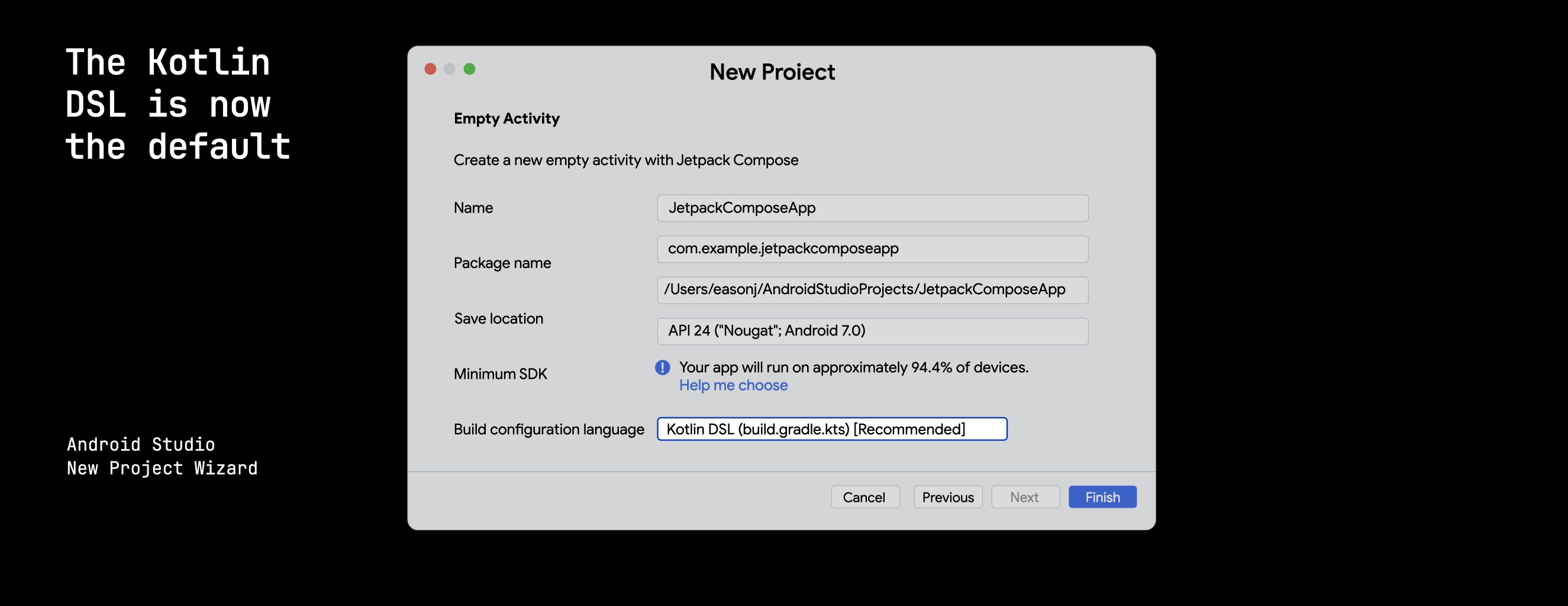
Kotlin adoption inside Google
Since Google officially started supporting Kotlin for the development of its own products, adoption of the language at Google has grown far beyond Android applications. The Kotlin codebase at Google has grown to over 15 million lines of code, doubling year over year. In fact, more than 45% of Google engineers using Kotlin write server-side code, and the Google Workspace team is exploring the possibilities of Kotlin Multiplatform.
Learn more about Google’s investments in Kotlin in their KotlinConf blog post.
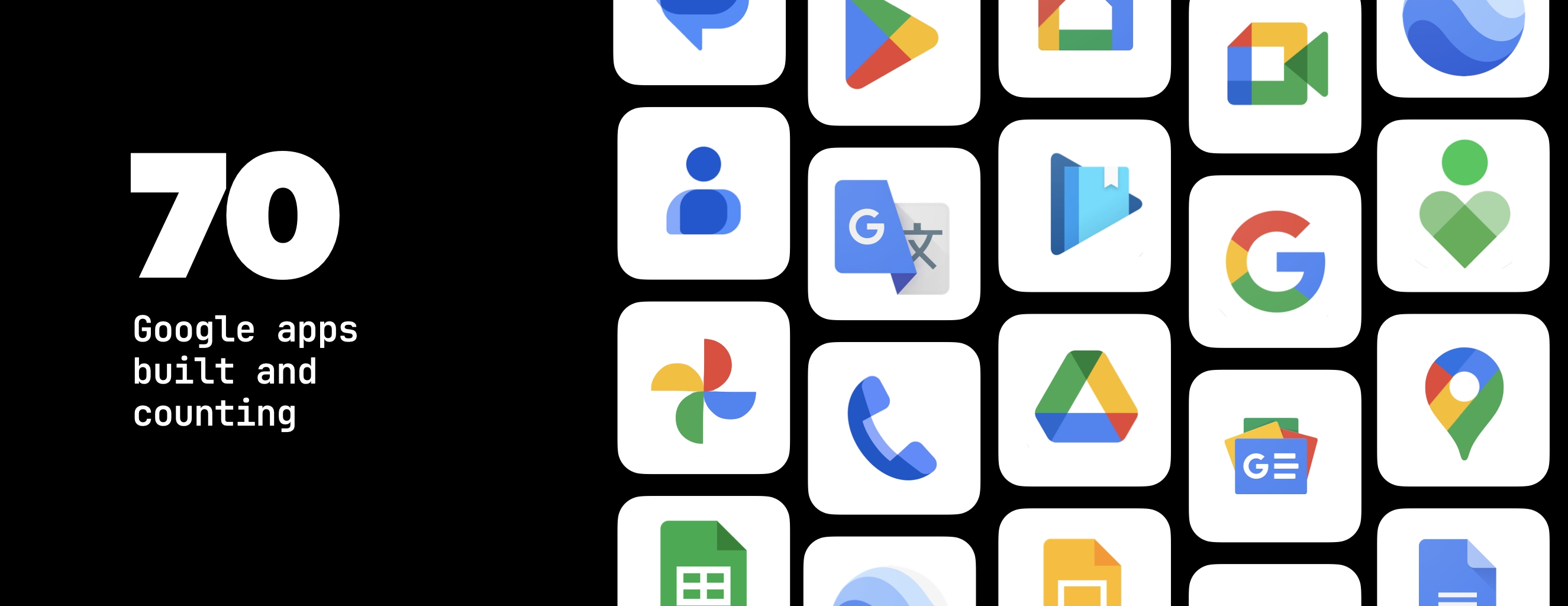
The Kotlin Foundation to fund multiplatform library authors
The Kotlin Foundation is now offering grants to support individual contributors! This program is focused on assisting authors of multiplatform projects, as well as those looking to expand their projects to Kotlin Multiplatform.
The Kotlin Foundation Ecosystem Committee will consider the project’s target audience, the issues it aims to solve, and its stability when reviewing applications. It is also important to adhere to our recently published Library API guidelines.
The first round of submissions ends on May 15. Read more about the program and apply!
Kotlin Foundation membership program
The Kotlin Foundation has launched a membership program, welcoming more companies to collaborate on language development governance, advance the Kotlin ecosystem, and promote the language.
The first members to join the Kotlin Foundation are Gradle Inc., Touchlab, and Shopify. Those companies are well known in the Kotlin community for their incredible contribution to the language and the ecosystem.
Join the Foundation and build a connection between your company and the community to shape the future of Kotlin!
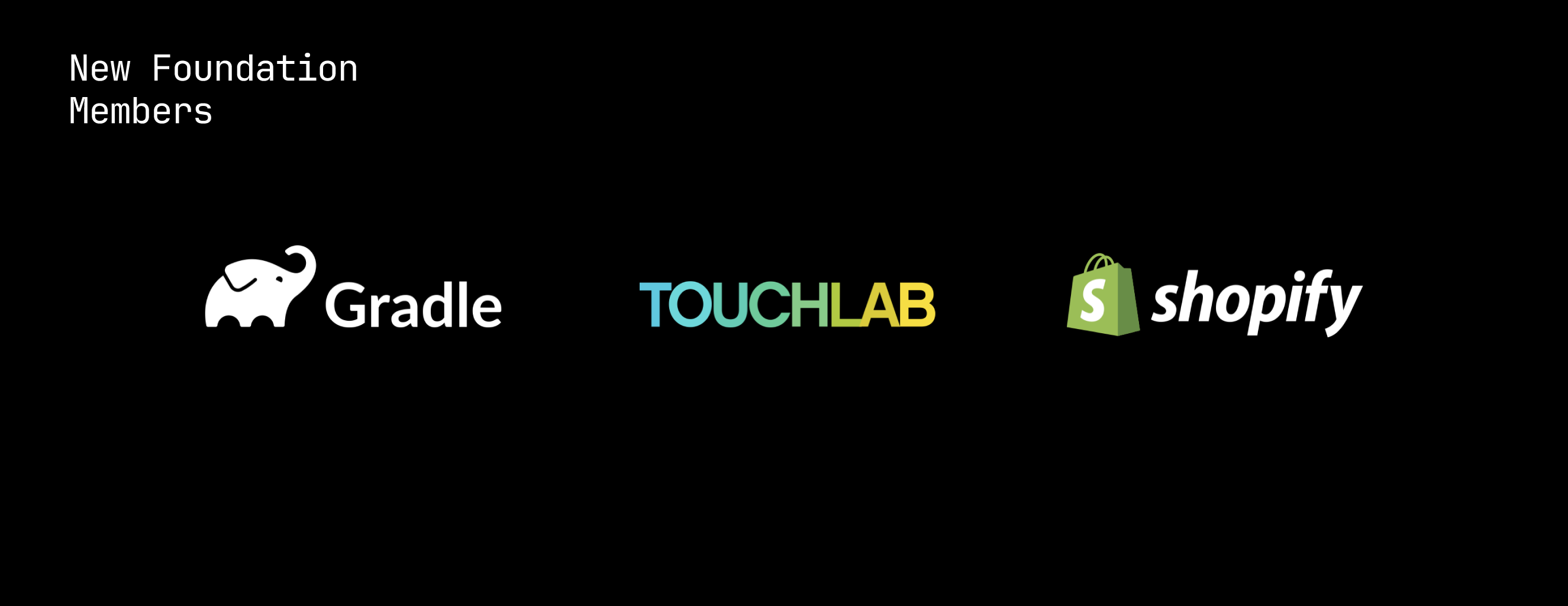
Kotlin Multiplatform is on its way to Stable
Kotlin Multiplatform has experienced incredible adoption and boasts a rapidly growing ecosystem thanks to a significant community contribution. The number of Multiplatform libraries exceeds 1,000 and covers virtually any use case you can think of! An upgraded set of Jetpack libraries is among them, thanks to Google’s contribution.
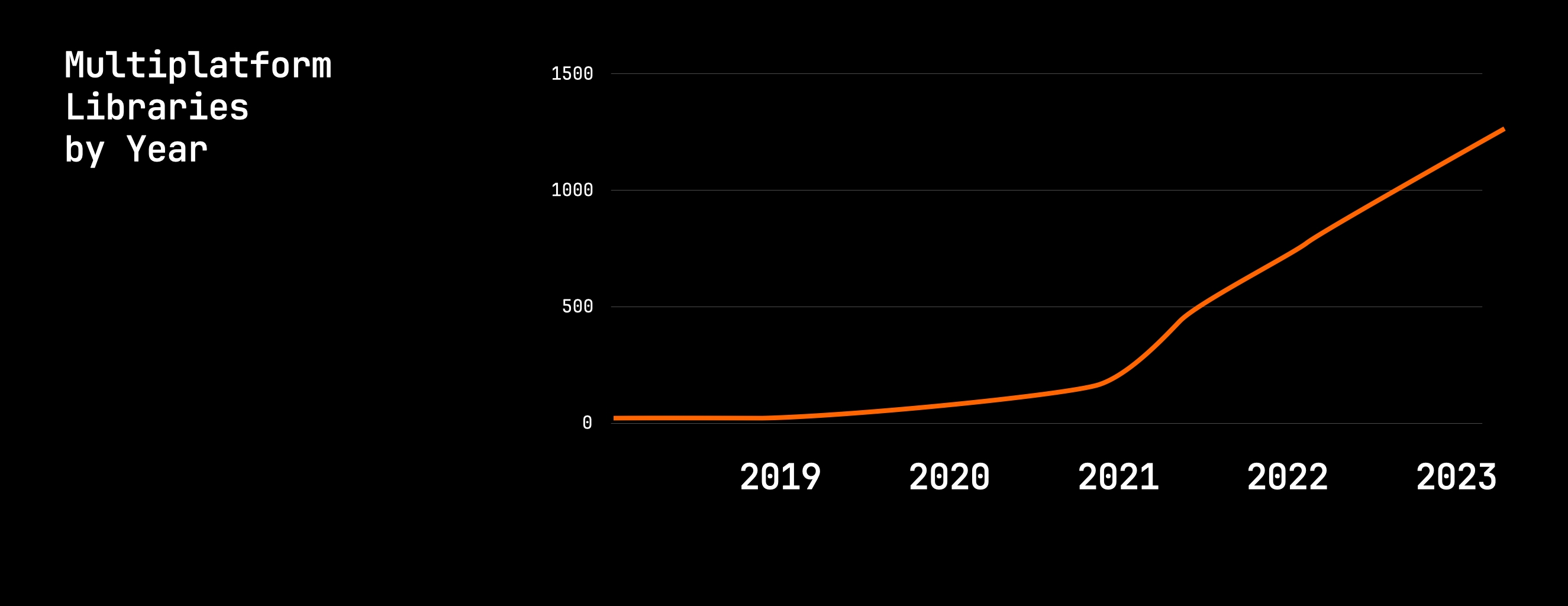
We have successfully validated concepts such as memory management, project configuration, and multiplatform libraries, and in 2023 we’re fully committed to bringing Kotlin Multiplatform to a stable release.
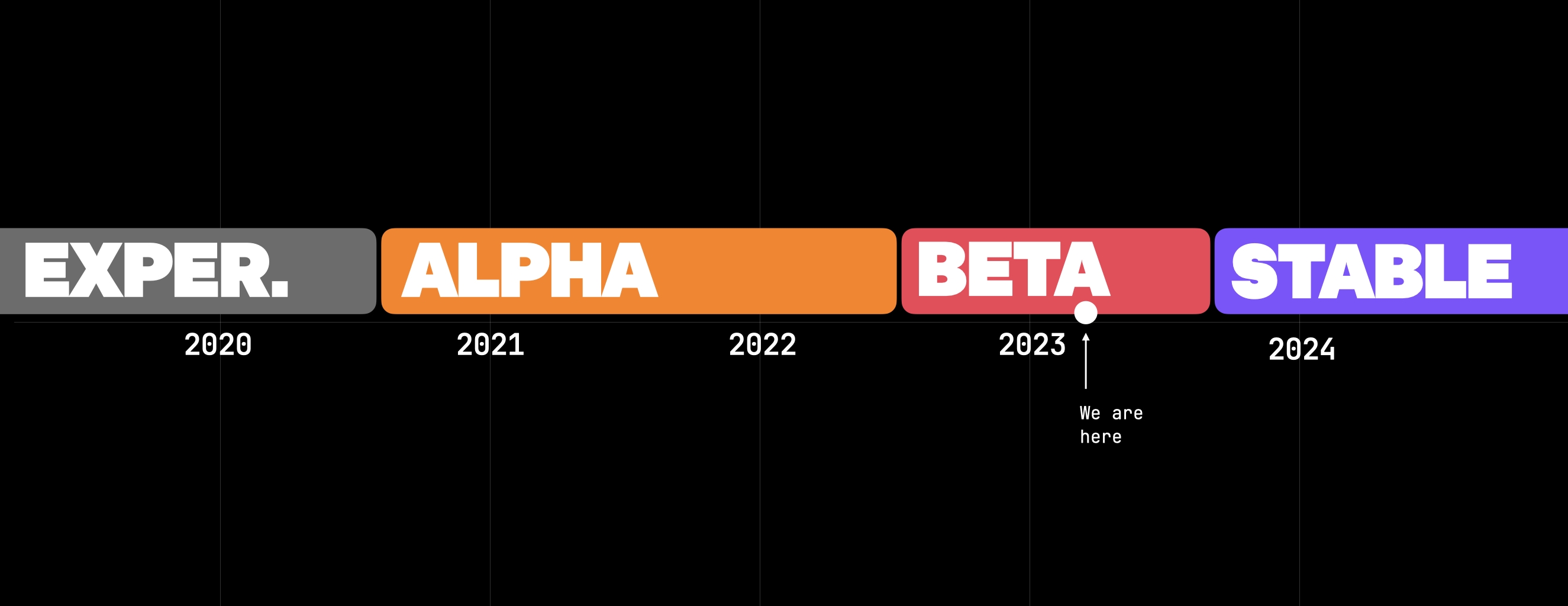
With its versatility, extensive ecosystem, and all-platform coverage, Kotlin Multiplatform has the potential to become the go-to choice for cross-platform development. There was one piece missing in that puzzle – a cross-platform UI – and we’ve added it!
Compose for iOS in Alpha
The Alpha version of Compose Multiplatform targeting iOS is now available. Now you can use Compose Multiplatform to build the same app on Android and iOS. While the benefits of a shared UI for mobile development are significant, the natural flexibility of Multiplatform empowers you to choose whether to share your app’s business logic and keep the UI native or go cross-platform for both. It’s up to you – share the code on your terms! Of course, you’re free to use other UI frameworks and design systems in addition to Multiplatform.
Although it’s in Alpha, we are committed to bringing iOS support to Compose Multiplatform. Want to help? Give it a try, and share your feedback with us in the Kotlin Slack #compose-ios channel (if you’re not a member, apply here).
Experimental Compose for Web powered by Kotlin/Wasm
We’re continuously expanding Kotlin to embrace emerging platforms. You may have already tried the Experimental support for WebAssembly in the latest Kotlin version, and now you can also experiment with porting your existing Compose code to the web using Kotlin/Wasm, as a prototype is available! Share your feedback with us on the Kotlin Slack #compose-web channel (if you’re not a member, apply here).
More fun facts and stats from the keynote
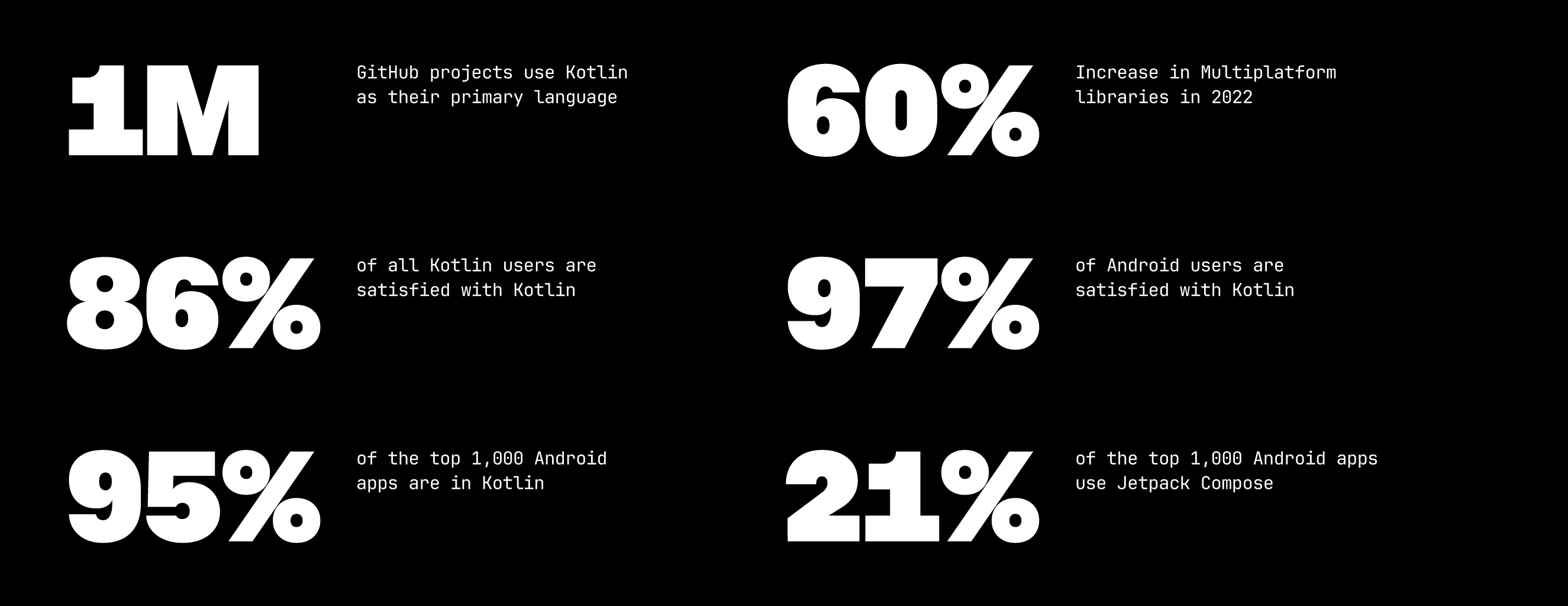
- Over 1 million GitHub projects use Kotlin as their primary language.
- The number of Kotlin Multiplatform libraries increased by 60% in the past year, and the growth is continuing at the same rapid pace.
- 86% of all Kotlin users across all platforms are satisfied or very satisfied with Kotlin.
- 96.9% of professional Android developers using Kotlin are satisfied with it, and this rate is 9 percentage points higher than that for their Java counterparts.
- Kotlin is the most popular language for Android development, with over 95% of the top 1,000 Android apps using it.
- Over 21% of the top 1,000 Android apps use Jetpack Compose, which is more than double the number from last year.
Thank you, and enjoy KotlinConf 2023!
We are deeply thankful to everyone in the community who has passionately contributed to shaping Kotlin into what it was envisioned to be – a language for the industry that empowers developers to build any part of an application with confidence and joy.
Enjoy the KotlinConf 2023 livestream. We recommend the following talks for a deep dive into the major announcements:
Kotlin 2.0:
- How We’re Improving the Performance of the IntelliJ IDEA Kotlin Plugin by Vladimir Dolzhenko. April 14, 13:00 CEST.
- K2 Compiler Plugins by Mikhail Glukhikh. April 14, 10:15 CEST.
Kotlin at Google:
- Adopting Kotlin at Google Scale by Jeffrey van Gogh and John Pampuch. April 13, 10:15 CEST.
- Kotlin Multiplatform in Google Workspace by Jason Parachoniak. April 13, 11:15 CEST.
- Kotlin Multiplatform Conversions at Android Jetpack Scale by Dustin Lam and James Ward. April 13, 13:00 CEST.
- Adventures Building a Kotlin Multiplatform Benchmarking Library by Rahul Ravikumar. April 13, 16:15 CEST.
Compose and Multiplatform:
- Compose Multiplatform for iOS by Sebastian Aigner and Nikita Lipsky. April 13, 15:15 CEST.
- You Can Do Desktop Too! by Victor Kropp. April 14, 10:15 CEST.
- Level Up on Kotlin Multiplatform by Pamela Hill. April 13, 14:00 CEST.
More resources
- The K2 Compiler Is Going Stable in Kotlin 2.0, a blog post by Roman Elizarov.
- The Kotlin DSL Is Now the Default for New Gradle Builds – blog posts by Google and Gradle.
- Announcing the Kotlin Foundation Membership Program.
- The Kotlin Foundation Grants Program Is Live
Subscribe to Kotlin Blog updates






